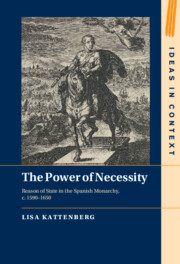Book contents
- The Power of Necessity
- Ideas in Context
- The Power of Necessity
- Copyright page
- Dedication
- Contents
- Figures
- Tables
- Acknowledgements
- Introduction
- Chapter 1 Necessity and Counter-Reformation Reason of State
- Chapter 2 ‘The Inexhaustible Ocean of Politics’
- Chapter 3 Virgilio Malvezzi and the Mosaics of Morality and Necessity
- Chapter 4 Experience, Conscience and Necessity
- Conclusion
- Bibliography
- Index
Chapter 2 - ‘The Inexhaustible Ocean of Politics’
Tacitus and the Political Counsel of History
Published online by Cambridge University Press: 22 December 2022
- The Power of Necessity
- Ideas in Context
- The Power of Necessity
- Copyright page
- Dedication
- Contents
- Figures
- Tables
- Acknowledgements
- Introduction
- Chapter 1 Necessity and Counter-Reformation Reason of State
- Chapter 2 ‘The Inexhaustible Ocean of Politics’
- Chapter 3 Virgilio Malvezzi and the Mosaics of Morality and Necessity
- Chapter 4 Experience, Conscience and Necessity
- Conclusion
- Bibliography
- Index
Summary
This chapter explores ideals and practices of turning classical histories into political lessons for the present, focusing on a number of individuals who translated the histories of Tacitus into Spanish, while they also served their king as soldiers, counsellors and informants. All testified about the practical value of Tacitus in the present, as they struggled with the internal contradictions and the fact that their author had produced the texts many centuries ago, in a different, pagan world. The counsel of historical experience was tirelessly advocated in reason-of-state discourse, and this chapter shows that the call was answered in practice as the Tacitists in various capacities engaged with the problem of the Dutch Revolt. The chapter argues that although they were well aware of change, they had no scruples in using anachronism and historical analogies, or using the ancients as rhetorical tools to express their ideas and further their political aims. Memorials and pieces of counsel were written from the perspective of events from recent history and could effortlessly be placed alongside Tacitean phrases. Yet the ancient past was also a safe space that could be used to criticize present policies or express warnings, without infringing on the domain of Providence.
Keywords
- Type
- Chapter
- Information
- The Power of NecessityReason of State in the Spanish Monarchy, c. 1590–1650, pp. 79 - 126Publisher: Cambridge University PressPrint publication year: 2023

